#then we also have other music related things with Ted and Trent
Explore tagged Tumblr posts
Text
You want me to go full on crazy Tedependent theorist? Because I will, I will go full on crazy Tedependent theorist. What do I have to lose? (Except my dignity but that’s non-existent to begin with so 🤷)
Ted once said this: "I remember being a little kid, sitting in front of the television and watching Queen perform right over there during Live Aid."
He has a moustache that resembles Freddie Mercury’s. He’s even brought up the whole back story as to why he has it. (Also being told that he shouldn’t have a goatee right before he walks down the aisle and then he decided on this moustache and he never looked back…) in the same speech he says “Since I was a straight fella in Middle America working in sports.” Which leads me to episode 11.
In this episode they mention that Freddie Mercury owned Richmond briefly in 1980 and that he tried having “Fat Bottomed Girls” as the team’s song. And Rebecca tells Keeley and Higgins that her father went to art school with Freddie and that Freddie supposedly said that his greatest talent was “flipping straights”. So young Ted saw Queen perform at Live Aid and then when he was older he grew a moustache similar to Freddie Mercury’s? 🤔
Then we have the song in itself. You know who wrote “Fat Bottomed Girls”? Brian May. Who famously has fantastic, long hair.
Whose hair was brought up for the first time, explicitly, in the show this episode? Trent’s hair. And it was brought up by Ted’s mum. And Ted has previously commented on hair as something he seems to like. (He kind of alluded to Trent’s hair in the second episode of the third season but he never outright states that he likes it. And Trent asks Ted if he assumed that Trent could ride a bike because of his hair and the whole vibe). And I’ve talked about hair in THIS POST but the gist of it is that hair has been referenced before, in relation to romantic couples with Roy and Keeley, Higgins and his wife, Sam and Rebecca.
I can’t verify this quote because I don’t have the magazine. But I’m adding it here anyway:
May told Mojo magazine October 2008: "I wrote it with Fred in mind, as you do especially if you've got a great singer who likes fat bottomed girls… or boys."
“Fat Bottomed Girls” is also connected to the song “Bicycle Race”, written by Freddie Mercury, they were released as a single together. And they both reference each other. “Bicycle race” is sometimes viewed as a metaphor for being bi. (Sport as a metaphor, anyone?)
Who doesn’t know how to ride a bike? Trent. Who has a moustache similar to Freddie Mercury? Ted. Who might be bi? Ted.
Look, I told you it’s crazy but I couldn’t help myself. I’ve talked about Queen/Freddie Mercury in relation to Ted before. So I couldn’t let this opportunity pass me by.
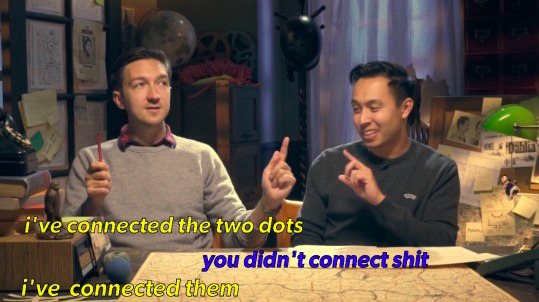
#ted lasso#ted lasso spoilers#tedependent#then we also have other music related things with Ted and Trent#like Trent wearing a Dolly Parton shirt in two episodes#and in this episode Beard and Ted talk about singing Dolly Parton’s Islands in the stream at karaoke#and then Ted sings part of the song as he walks out#when it comes to clothes Trent is wearing his western shirt that he wore when Ted talked about being a straight fella#and he’s wearing it when he meets Ted’s mum who compliments his hair#and considering what James Lance has said about Trent’s shirts having meaning…#James Lance wore a Dorothy shirt to some event related to Ted Lasso#and in this episode we focus a lot on Kansas and they watch You’ve got Mail and the final scene in that movie has Somewhere over the rainbow#playing in the background#Dottie is a nickname/shortening of Dorothy#look I just want someone to love Trent okay#and I would love for it to be Ted and it would make so much sense#but at this point I’ll take anyone just give him someone to love and be loved by#nicole watches stuff
161 notes
·
View notes
Text
ted lasso, post-finale thoughts.
I went into the finale thinking yeah, if the writing serves, I can accept any outcome even if it's not exactly what I want. Instead, I was hit with a plethora of mixed emotions I didn't expect to have. Confusion, anger, hurt, annoyance, small bursts of joy in between, and just deep sadness. Almost 20 hours later and I'm still incredibly dissatisfied and processing. For the most part, finales should provide a feeling of celebration and relief. I... don't feel any of that.
I'm just really trying to pinpoint why I'm so sad.
Of course everything inevitably has to come to an end. Of course Ted was always going to reunite with his kid. Of course it's not about winning or losing. Of course Tedbecca can remain platonic if that was always the plan. Of course that's the way life goes, but...
For a show (and this season particularly) that constantly encouraged us to 'believe' and 'hope' in the idea that 'everything will work out', all those 75 minutes did was take me on an unsettling, emotional journey for no concrete reason other than to mess with the audience (the opening scene was just adding salt in the Tedbecca wound I've had since S2). Because everything in a macro sense, "worked out". But the WAY it "worked out" does not sit well with me?? And it's supposed to? For a lot of people (on Reddit/Facebook, lol), it was enough?? Richmond not technically winning and Ted leaving like that without so much as a tear? What am I missing??
When I tell you I'm trying to embrace the good parts, I'm really trying. Yes to KBPR & the women's team, Yes to Colin kissing his fella, Yes to Rebecca & Mae & the guys owning the club, Yes to Roy becoming Manager.
So... why am I still so upset? Hmm, let's see.
The boys' musical number? The cutest. Ted didn't think so.
Nate's apology? Heartbreaking. Ted didn't bat an eyelash.
Rebecca begging twice for Ted to stay? Ted, absolute silence.
Beard staying/getting married in London to his toxic gf? Comic relief, haha, fine. Except Ted wasn't there as Best Man.
Don't even get me started on the huge disservice to the Roy/Keeley/Jamie triangle.
Now listen, I get that he misses Henry & Henry misses his dad. I'm not that cold. A father/son's love is important. It was always the catalyst for this show; for him to work on himself so he can be a better father unlike the one he grew up with. That's fine.
But on this particular week. His last week with his Richmond family. There was NO sense of him being sad to leave them. He can be sad about missing Henry but he can ALSO be sad about leaving. No, he just completely checked out. He let everyone pour out their hearts (Hannah's getting her third Emmy, mark my words) to him, and he just stone-faced the entire time.
THIS DOES NOT MAKE ANY SENSE TO ME.
The argument is that he was internally processing, he was overwhelmed, he was trying to distance himself so it would hurt less. Fair points, okay. But this is a television show, moreover, A FINALE. TV characters, while relatable, are heightened versions of ourselves, there so we can better process our emotions and learn to handle things better in our real lives. Ted deserved MORE dialogue and displaying MORE emotion than whatever this was.
We're never going to see him again. We're over here crying along with Rebecca, Nate & Beard, but he didn't sob once. Even though he spent three years building a family with them. I even thought, hey at least he left his legacy with Trent's book but newsflash, he wanted his name taken off that too! Complete erasure.
I just feel so robbed of better moments. Like there were nice moments here and there. But they could've been BETTER. Honestly, Nate & Rebecca's breakdowns were close to perfection, so much love there. But the lack of dialogue and Ted not reciprocating? Broke ME.
I just cannot. understand. this. choice.
Massive sigh. I'm just truly baffled by the way everything wrapped up and not getting the satisfied feeling that one half of the viewership got. Maybe I'm in the minority, but that means something. It carries weight. Also, for a "three-season arc" that was planned well in advance, why all the rewrites and parallels and fakeouts... it's just cruel. But as the theme says (and maybe this was a warning all along), yeah, I guess this might well be it.
This show has given us so much and the last season flailed for the most part. I don't want to disrespect the show by being negative and cynical (looks like I failed!!) or cast blame on anyone in particular. The cast/crew are amazing people and I'll be grateful for being a part of the journey but I'm just so sad and this feeling sucks and I will never get over it.
Going to miss them. x
328 notes
·
View notes
Text
A kinda long analysis of some scenes in The Sound Of Music in relation to the Ted Lasso finale, TedTrent, and Ted's bisexuality ahead.
Since they decided to name the finale as a reference to The Sound Of Music, and perform a song from it as well, I've decided to look into it. After all, Ted has always been pretty similar to Maria. They're both enthusiastic, positive, they come into this family's life, and, while uptight and closed off at first, it eventually warms up to them. They both help their new family become better.
And then they leave.
Why?
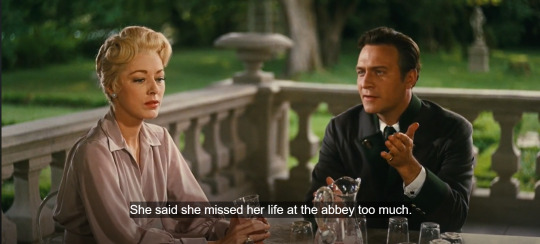
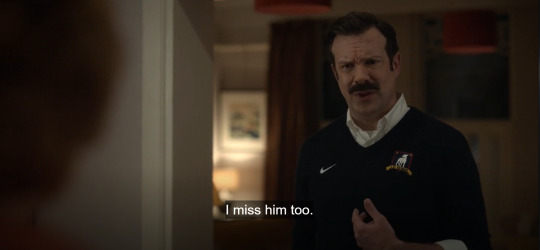
They both say it's because they miss their old lives. But Maria actually leaves because she has developed feelings for the Captain. Meanwhile I think Ted missing his family at home is genuine. (However, he had a chance to have both his Richmond family and his Kansas family at the same time. And there's some debate of the reason he didn't want that)
In The Sound Of Music, we get glimpses into Maria's life after going back.


Sound familiar?
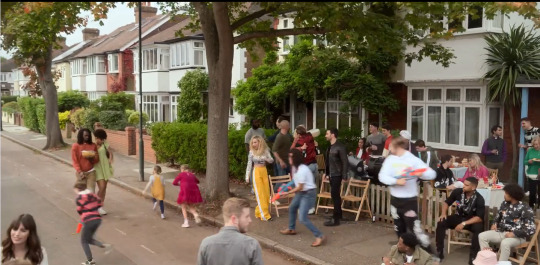

All these shots of people he loves who you think would want him there. Even his own best friend's wedding. And where is Ted? Why is he missing these moments? Why is he so isolated?
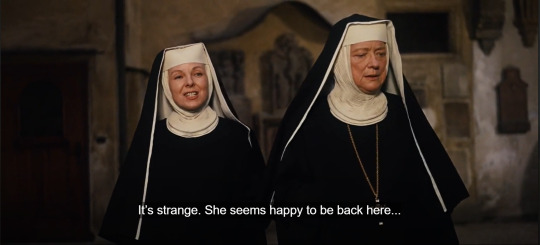

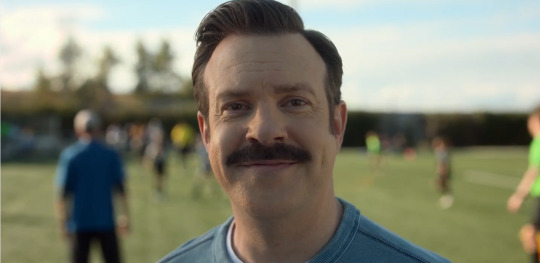
Uhm... Hello???? If there's one way to describe Ted's face in this scene, it's this.
Now this is where Ted's story ends. But Maria's continues, having a very intense conversation with Mother Abbess about feelings you've never felt before, having something deep inside you that you can't face, being confused, and not wanting to betray God. This seems very queer coded to me.
On the other hand, she thinks that she is only in servitude of God, and accepting the Captain's love would be distracting her from her mission as a nun. To which Mother says, that just because she loves The Captain, that doesn't mean she loves God less.
Now that got me thinking about Ted, and the way he left everything behind, and the way he rejected everyone's love for him, and the way he seemed to think that was the right thing to do in order to fully love and be there for Henry.
But Ted was a great father, even in London, and he didn't need to sacrifice all other things he loved for him. (Of course, parents would sacrifice everything for their kids, I'm just saying Ted didn't have to).
Loving Richmond didn't mean he loved Henry less.
Mother Reverend also says this:
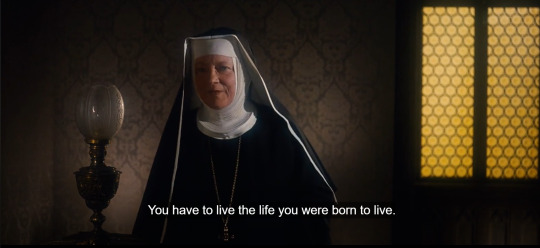
Which reminds me of what Trent said earlier in the episode:
"I don't think we change, per say, as much as we learn to accept who we've always been"
Next she sings the song "Climb Every Mountain",which finally convinces Maria to go back. Here are some of the lyrics:


Which, first of all. Rainbow??? Ok.
Like the rainbow in Ted's hallucination? Like the bi flag in that same hallucination that helped him get unstuck and get as close to achieving his dream as he could, with Total Football.
Secondly, this reminds me of Ted on the plane, doubting himself. Thinking about how they could've won the whole fucking thing. And later, the lyrics from "Father and Son" that play while Ted looks at the snowglobe.
"For you will still be here tomorrow
But your dreams may not"
How are we supposed to interpret this if not that Ted is abandoning his dream,Richmond?
And that someone needs to make him realize his dreams are important, too?
Next, Maria comes back and greets the Captain in an interaction that reminded me a lot of Ted and Trent.


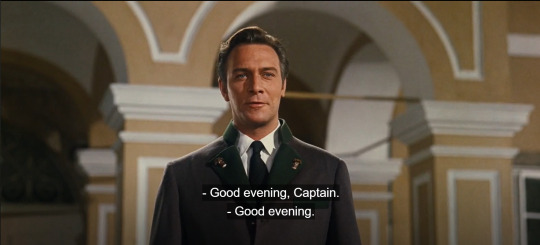

And then the captain says this:
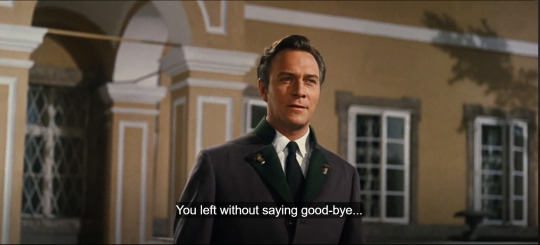
Which is a criticism I heard a lot about the finale. The entirety of AFC Richmond said goodbye to Ted in big ways, and small ways, but he never said a proper goodbye to any of them. A proper, heartfelt goodbye in which he said something substantial, anything that anyone deserved to hear from him, after spending the past 3 years loving him, being by his side and believing in him.
With Maria returned, The Captain breaks up his engagement to The Baroness.
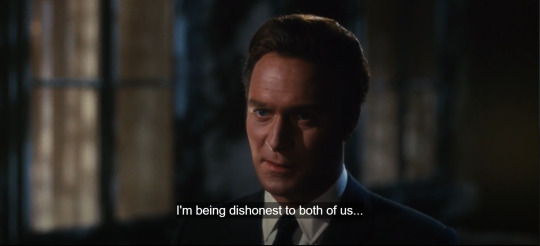
He says he has been dishonest. He has hidden his feelings and he can't hide them anymore. Reminded me of Trent, saying he had to come out to his wife 2 times before her believing. Trent, hiding his real feelings from a woman he couldn't love the way she wanted him to.
To which the Baroness gets defensive and acts like she's the one who wants to break up. That she doesn't think he's the right man for her.
Why?
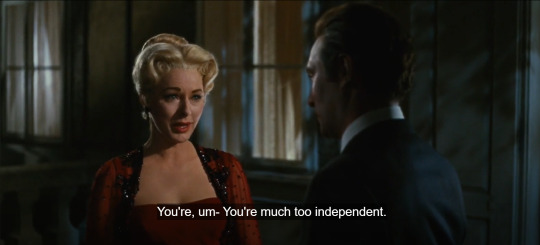
I laughed out loud when she said this, ngl.
Next, The Captain talks to Maria in the garden about her plans to leave again soon.
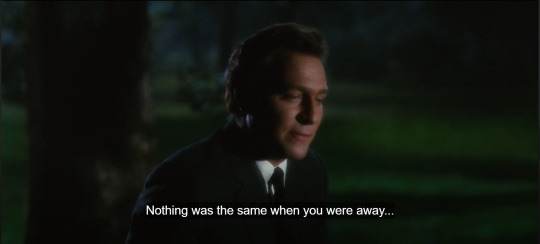

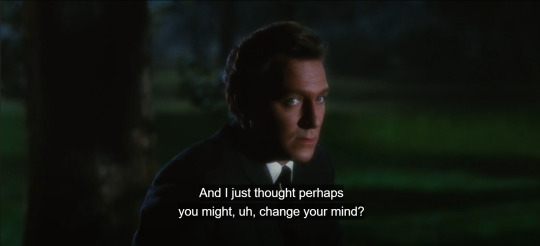
Again, reminiscent of Keeley and Rebecca asking Ted to change his mind, and stay. And the book Ted is holding on the plane "How to Change Your Mind: The New Science Of Psychadelics".
The part where he says "it will be all wrong again after you leave". Let's talk about that. Because as Ted leaves, Roy and Jamie throw away years of development and go back to their old dynamic. Nate is a kit man again. So much regression. Beard, going home to an abusive girlfriend. And Ted, who was learning to break free from society's idea of what a family should look like, Ted, who wanted to be free and fluid, going back into those boxes.
For these characters, it's like the show was folded in half,to get the beginning and the end to touch. For them, it's like starting from zero. It's like everything they've been through has been for nothing. (Roy even specifically calls this out).
Back The Sound of Music, Maria and The Captain finally confess their feelings to each other.
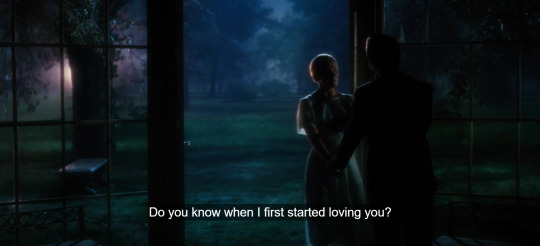
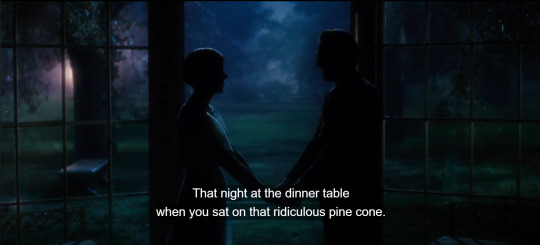
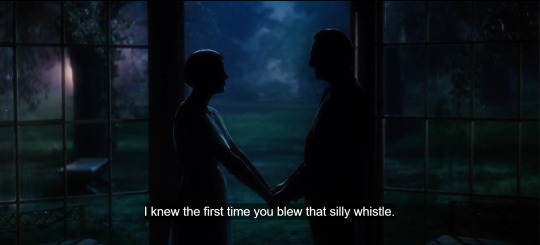
Are you kidding me? A whistle? You mean like coaches have?

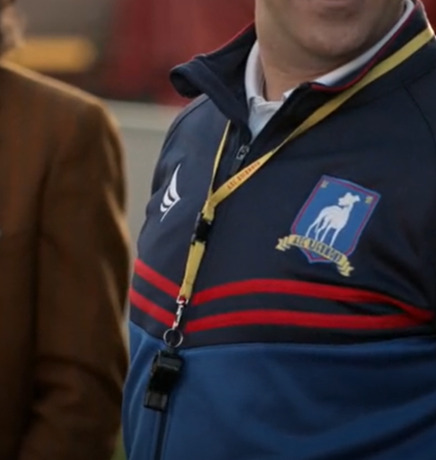
Anyway, this is all the parallels and things I've found interesting while watching this part in The Sound Of Music. I could go on for longer, but this movie is 3 hours long of scenes that remind me of Ted.
"Yeah, it might be all that you get
Yeah, I guess this might well be it."
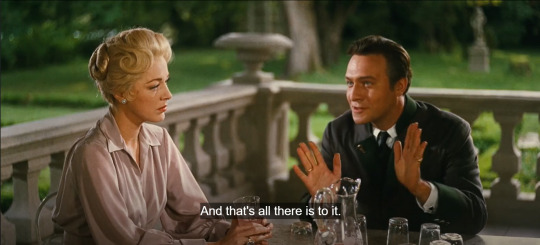
#ted lasso#ted lasso spoilers#Ted lasso finale#Season 3#Episode 12#so long farewell#The sound of music#bi ted lasso#Bisexual ted lasso#Trent crimm independent#Tedtrent#Ted x trent#Tedependent#My post
152 notes
·
View notes
Text
Ted Lasso Progress Report 2.0: They lost. They tried their best and they got their team together and Ted got Jamie to come around and Roy had his last hurrah and still they lost. Well. If that wasn't one of the most heart-breaking, brilliant things a show has ever done. I kind of knew they will loose through fandom osmosis, but sometimes fandom gives off false signals so until the last moment of that Man City game I kept hoping they'll win, but they lost. Hope really is what kills you. On the bright side, Jamie got a soldier!
I had to stop my binge for few days cause I’ve been working nights, the horror. But I’m back, I will shortly start on a second season, I’m beyond excited and rather scared, because there’s no way this show can stay this positive with the things it’s been dipping into towards the end. God where do i start I love it so much. Jason Sudekis is still everything, that panic attack omg that entire episode was so good. I’m so glad they allow Ted to be sad and angry, but still have him apologise immediately. That scene where he looses it for just a moment at Nate at the end of a very bad day was just so humanising. On the topic of Nate, he’s still my spirit animal, and I’m SO happy with his promotion ngl I cried when that happened. I am worried though, because there is one very obvious direction they can go with him, and I think they will go there, because we’ve seen now several times that when he is allowed, or thinks no one sees him, Nate can be pretty… Mean. Come on Ted, your coaching son needs you too! You can’t heal years of abuse with just a little bit of kindness and a promotion. I love how the topic of parenthood is being slowly explored, mainly through Jamie, but also Nate, and Ted as a father, Roy as a surrogate father, and Higgins. Even Trent Crimm (The Independent) has a daughter! I love Higgins finally standing up to Rebecca, although i wish he got just a liiiittle bit of karma for being Rupert’s lackey all these years, and I love her coming to him after coming clean to Ted. I love how her finding a true ally in Higgins is tied to Ted, who was the first person in a long time to show her having a support team around her can be a good thing. I continue loving all my football sons, Dani Rojas being just an excellent addition all around, and I was so happy that Isaac made the captain. The entire ghost episode was just chef’s kiss, but also I think it was the last truly happy episode before things will have to get worse to be fixed for real. I loved, loved, loved the whole darts thing at The Crown and Anchor. God Rupert is such a bastard but things get so interesting when he’s on screen! Roy and Keeley are everything I wanted and I’m living for them. Also I really like how masculinity is explored through Ted and Roy and them being almost foils to each other in this theme. Roy is on first glance everything we associate with masculinity, and especially it’s negative parts - he is angry, silent, intimidating. And Ted is seemingly not very traditionally masculine. He is cheerful, easy-going, he seems in touch with his emotions, dresses plainly, likes puns and musicals, he is a carer. But looking at their actions, I think Roy’s masculinity is actually very healthy, while Ted’s pretty fragile. Roy does yoga and gossips with a bunch of old ladies and isn’t ashamed of it, he quite readily admits when he’s wrong, is a great role model and a carer for his niece, he is honest about his emotions. And Ted bottles everything up until he explodes, hurting either himself or others, he blames himself for a failure of his marriage and seems to tie a lot of his self worth to being a good husband and father. He cheerfully demands vulnerability from other people, but refuses to open up (even Beard, who as far as we know is his best friend, doesn’t appear to know much about Ted, or at least all of their conversations that aren’t work related tend to revolve around Beard’s personal life, not Ted’s), and he is ready to offer support to his friends but hides and feels ashamed when he needs it himself. Outwardly Ted presents positive, accepting and open masculinity, but I think he might have a case of… Uh, internalised misogyny.
Welp, this has turned out into a rant, time for a second seasons I’m so scared let’s go, woooo!
(And sorry everyone who likes Ted/Rebecca, I can’t see it, they’re perfect besties and if they try to force a romance I don’t think I’m going to like it. They are kinda foreshadowing it and I’m like, pls no, give me a healthy, close male-female friendship, please don’t take it away from me please for the love of god.)
#ted lasso#ted lasso spoilers#i think I’m gonna pay for Apple TV just for this show#also they deserved all the emmys and globes#and all the awards
1 note
·
View note
Text
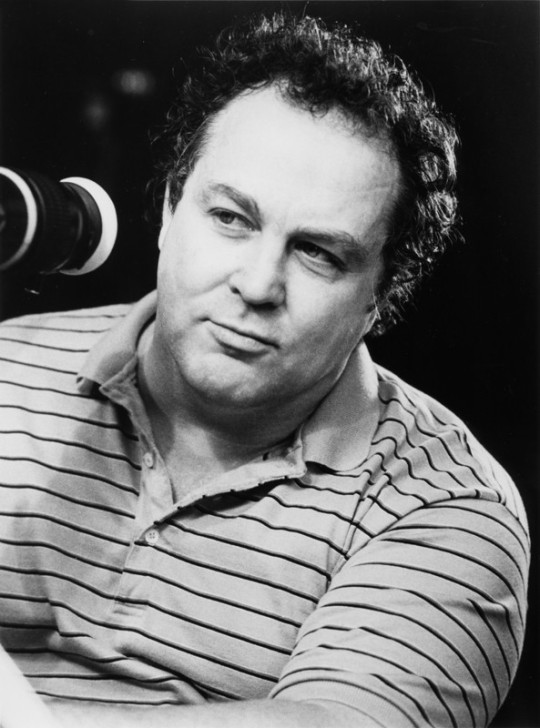
Clark was born in New Orleans in 1939.
“We moved to Birmingham, Alabama, we were lower middle class, but we actually had a maid. I used to go with the maid on weekends to what would have been called ” Colored Town” to play with the kids there, I loved them. When I moved to Fort Lauderdale in the 1950s, it was a restricted community, and I went to a segregated high school. There were ” No Jews Allowed” signs on the beach still, and I didn’t understand this, it shocked me. I lived on the west side of town, which was near ” Colored Town” then, as well as the Florida Braves baseball stadium. I was quite a savage little being, we were very poor, my father died, my mother was a barmaid, so I pretty much ran the streets. I used to climb up on the top of the fences of the baseball stadium, and run along, and the guards would chase me. The black kids called me ” Cheetah,” and they would meet me later, and say ” Hey, you’re Cheetah!”. I used to go to the theaters down on Las Olas Boulevard. I did like horror movies, but I liked all movies.
I had no intention as a youth of perusing a movie career, but I always wanted to be writer from the earliest time I could remember. It wasn’t until I got into college that I started to think about films seriously. I was a film buff, but not an addict if you know what I mean…I wasn’t crazy about films but I liked ’em. So I’d say it was probably at college, at the University of Miami where I started thinking about making films. It’s a long, long story but I got into films when I was an actor in the local Miami film industry of the mid sixties.
Las Olas Boulevard, Fort Lauderdale 1950’s
After college in 1964, Bob was directing a stage production of Arthur Miller’s “A View From a Bridge” in Miami when was approached by Charlie Brunn. Charlie was a cross-dresser, his wife was a very butch lady and they had three kids, it was a strange situation. He owned Lee High Acres, a manufactured community in the Everglades, and was bent on being a movie producer. “He came up to me and said “I’m doing a movie on Miami Beach and you’re going to direct it. At that point I knew nothing about film cutting, continuity, nothing. These people promised that they would teach me. When I got on the set they knew less than I did.”

The odd circumstances continued when he found out that this zero money production was to be called THE SHE MAN and starred a transvestite.
“The ‘She Man’ script idea was about a Korean war veteran who was a deserter and the way he hid out was to disguise himself as a woman. It wasn’t a comedy either, it tried to be a serious spy thriller.” Local townspeople were recruited as actors and filming commenced in the hydroponic greenhouse and funeral parlor of Lee High Acres, which served as soundstages. “It was a remarkably surreal experience, and the results, as you might expect under the circumstance, were incomprehensible. John Carradine was in it and Lila Lee, the silent film star, and it was an education. My editors name was Hack… get it? He was a local editor out of Fort Meyers. Nobody knew anything about filmmaking. My cinematographer was an ex-newsreel cameraman, nice guy. Nobody knew anything.
Next came The Emperor’s New Clothes.
CLARK: That one I’m willing to mention! I think it’s lost, but it wasn’t too bad. I got to work with John Carradine, Lila Lee and a great singing group. After I did She-Man, I asked Charlie, “Can I do this one?” I did ’em back-to-back.
What was Carradine like?
CLARK: John was a nice man. He was a severe alcoholic, fought the problem all his life, but he was there to work; he was a pro. When I did my first movie, I told Charlie, “I don’t know anything about movies.” And he said, “Oh, we got that covered with your cameraman and editor.” The cameraman [Gerhard Maser] was a WWII Nazi field cameraman and had never shot a feature. So I did She-Man with the famous book The Five C’s of Cinematography in my hand, figuring how to do continuity, etc. But by the time we did Emperor, I was kind of halfway there to understanding the difference between a movie and a play.
Another film was made back to back with THE SHE MAN called THE EMPEROR’S NEW CLOTHES, an original comedy script by Bob based on the Hans Christian Andersen tale, set in modern times. Starring John Carradine in the title spot, and featuring 60s pop group Spanky & Our Gang (“Lazy Day”) as “roving musical troubadours,” it seems quite a promising step up but seemingly does not exist for us to judge. “The soundtrack got lost when we ran into problems with the backers. I don’t think the film does exist.” This back to back baptism by fire set the spark though, and theatrical aspirations were abandoned.

“For the next five years, I decided that film was what I wanted to do with my life. So I did any job in the industry imaginable.” Florida was one of the most active hubs of low budget filmmaking around, making a steady stream of horror/rock n’ roll/biker/mondo drive-in fare and Bob worked steadily on more films than he can remember including some K. Gordon Murray films, including a stint as assistant director on Murray’s SHANTY TRAMP, the exploitation interracial romance drama that was “quite the shocker” at its time of release.
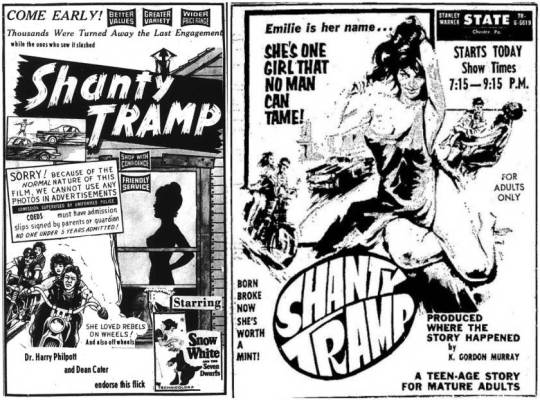
So I figured at that point what I would do was become an AD. That’s a nice position to be in to learn how everything works… it was interesting. But it was another four years when I started thinking with my friend Alan Ormsby that the next thing we were gonna do was a horror film first. That was just short of pornography to get a break in.
So, my first movie was Children Shouldn’t Play With Dead Things. My brothers and the Gotch family put up $40,000, and we made the movie. Ted V. Mikels agreed to distribute it in the States, but somehow it got to Canada and to Peter James, John Trent and David Perlmutter at Quadrant. They bought the film and distributed it, and it did very well in Canada.
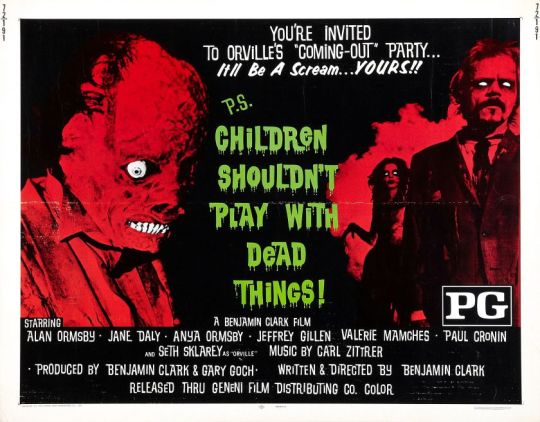
CHILDREN SHOULDN’T PLAY WITH DEAD THINGS
SUMMARY
The story focuses on a theatre troupe, led by Alan (Alan Ormsby). He is a mean-spirited director, who travels with the others by boat to a small island that is mainly used as a cemetery for deranged criminals, to have a night of fun and games. Once on the island Alan tells his group, which he refers to as his “children”— numerous stories relating to the island’s history and buried inhabitants. he leads them to a cottage where they are supposed to spend the night. He then opens a chest they had brought with them, puts on a mystical robe and says that they are to prepare for the summation at midnight. Alan takes sheer delight in torturing his cast with threats of firing them if they do not do as he pleases which always makes them go along with his plan. At midnight using a grimoire, Alan begins a séance to raise the dead after digging up the body of a man named Orville Dunworth (Seth Sklarey). Though the original intent of the ritual may have been solely as a joke, Alan appears disappointed that nothing happens.
Afterwards the party continues and Alan goes to extremes to degrade the actors, using the corpse of Orville for his own sick jokes. Then, however, animated by the fell ritual, the dead return to life and force the troupe to take refuge in the old house. Unfortunately for the group, the dead get their revenge, and in the movie’s closing credits we see the group of corpses boarding Alan’s boat with the lights of Miami in the background.
“I learned the whole business waiting until I could make the first film I had any control of, which was CHILDREN SHOULDN’T PLAY WITH DEAD THINGS.”
Shot in 35mm for $50,000 in 5 days and 11 nights at the Miami Dade County Nursery in 1970, CHILDREN, besides having one of the coolest titles for a horror movie, is one of the most enjoyable of the no-budget early 70s horror fare released in the wake of NIGHT OF THE LIVING DEAD’s success. Co-screenwriter/ makeup artist Alan Ormsby does triple duty in the starring role (in an amazing pair of vertically striped bell-bottom pants) as a overbearing, patronizing theater director taking his troupe out to an island graveyard for some black magic “games,” including attempts to revive the dead. While the horror PLAY WITH DEAD THINGS comedy mix is stagy at times, the script is obviously not by the usual cheapo movie bozos and the theater people archetypes (the joking fat guy, the emotional wreck, the flamers, the cynic, the stud, etc.) are fresh.
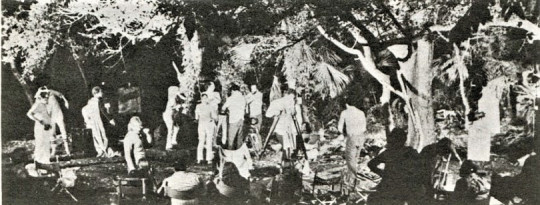
David Trimble and Forrest Carpenter designed and built the graveyard set.
CHILDREN was very much a homegrown project. The cast is made up largely of friends and students of my brother who was a professor at the University of Miami. The zombies are made up from doctors, lawyers and dentists from the area. We had the most elite group of cannibals of any film, I think. We were obviously inspired by NIGHT OF THE LIVING DEAD but we thought our comic approach was unique. The performances are a little amateurish but it holds up. In retrospect I think I learned more on that movie than I would off on three conventional movies.”
Informality led cast members in CHILDREN to refer to each other by their real names in the film. Contrary to what you might have read, Ted V. Mikels had nothing to do with the film’s making, but eventually did wind up distributing it through his Geneni company, and possibly receiving parts of the film’s generous box office that Clark and Ormsby did not. At the time Bob was in the Screen Actors Guild as Benjamin Clark to avoid confusion with another actor with his name, and kept the pseudonym for his director credit.
When did you meet Alan Ormsby?
CLARK: At the University of Miami. We were at the Rink Theater together. Both of us had an interest in writing and film, and the same sort of bizarre sense of humor. He eventually became the star of Children Shouldn’t Play With Dead Things. He also did all the make-up effects.

How did that film come about?
CLARK: It was done with private money, about $50,000, near Coral Gables, Florida. Again, it was done entirely with amateur actors. All those people crawling out of the ground at the end were college professors, wives and city councilmen.

Valerie Mamches getting ready for a scene (also pictured assistant cameraman John MacGowan)
The combination of slapstick humor and graphic violence was an odd mix.
CLARK: I felt it was original. But, let’s face it, it took a lot of inspiration from Night Of The Living Dead. I saw it for the first time a couple of years ago. Now I think some of the humor is a little heavy-handed, but the whole film holds up really well.
Did the low budget present any problems?
CLARK: We’d shoot all night and spend the day guarding the set from kids who’d get in and vandalize it. The film was shot over 11 nights. It would rain all day until 6 pm, when we’d start shooting. And it would start raining again at 6 am, when we’d stop. The film was touched by fate.
With the bad luck you’d had on the first two films, did you think this film would make any money?
CLARK: We were very naive. We figured we would make a lot of money–we didn’t, of course. But somebody got rich on it. It’s done quite well on cable and it’s had a good video life.
This slideshow requires JavaScript.
Lobby Cards & Advertisements
To what extent would you say that Children was influenced by Night of the Living Dead?
CLARK: I had seen Night of the Living Dead and admired it immensely, and indeed we based Children on it. We didn’t want to copy it, though. We saw Children as a satirical version of Night of the Living Dead. We wanted to have fun with the idea of it.
It certainly has a different look than George A. Romero’s film.
CLARK: We purposely tried to bring a look that was a bit different than Night of the Living Dead. Alan Ormsby would come to the set a few hours early to do the makeup effects, even though neither he nor or his assistant had any schooling about makeup other than teaching themselves. After Alan finished with makeup on the other actors he would come to the set and get ready to act in the film.
Interview with Alan Ormsby Exploited VHS (1999)
It had a much lower budget than Night’s $714,000 price tag, correct?
CLARK: We had so little money to make it. The truly independent film has the incredible problem of shortness of cash. When we started, it was nearly impossible to make an independent film. Nowadays it’s much easier; this is proven when you see how many independent films get slid into the realm of the major studios. We had $60,000 and we stole and cheated everything we could in gear and equipment. We only had eleven nights to shoot the whole film in Coral Gables, Florida, and it was not a short film.
How did you pull it off?
CLARK: I planned out every aspect of the film in great detail. I didn’t do storyboards, but I had [index cards of every part of the film, as well as schematics. If we were supposed to do seventeen shots in one day, we did seventeen shots.
You must’ve had a very dedicated crew.
CLARK: I am a great believer in the co-operative nature of film art. I believe it is a very wise and important thing to work with and listen to your crew and to hear their ideas. From the lighting people to the actors, I always take note of good suggestions.
It must have been a challenge shooting on location at night.
CLARK: Yeah, it was, but we were disciplined, we were determined. It was an adventure, to say the least. The night was a break in a way, because at least we were out. The gardens were a little bit isolated, so we didn’t have sound problems. But everybody was so committed. Those ghouls you see running around included an assistant dean of the University of Miami, a couple of professors, a very famous Miami Beach doctor…there are some pretty elegant people among the ghouls! They all wanted to have fun. And Ormsby did too; here he was, the lead actor, who did all that makeup. It’s not the best makeup ever in the history of ghoul movies, but pretty damn good considering that he had to do it all, every extra, everybody.
How did Children launch your career making features in Canada?
CLARK: When the film was first finished, horror schlockmeister Ted V. Mikels [director of Astro Zombies, The Corpse Grinders and The Doll Squad was just starting a small distribution company in the United States. They didn’t put much money behind the film when it came out and it didn’t do too well. Later, the film was bought by Quadrant Films in Canada and they put some substantial money behind the marketing and promotion of the piece, and the film was a moderate to large success in Canada and that’s where everything started. Quadrant later gave me money to finance my next picture, DeathDream.

INTERVIEW WITH SETH SKLAREY
Seth Sklarey played Orville, the abused corpse and later vengeful zombie, in “Children Shouldn’t Play With Dead Things.” The undead makeup job was augmented by Mr. Sklarey’s natural physical attributes (he appears to be both tall and lean). The result is a zombie you would definitely not want to be locked in a room with.
How did you come into the part of Orville? Did the person making the casting decisions already know you and think you were right for the part?
SKLAREY: A girlfriend of mine at the time bicycled up to me and said, “They are casting a horror movie and they described the look they wanted for the lead and it fits your description.” She took me to Bob Clark and he signed me on the spot for $350 up front and $350 at the end. I never saw the second $350.
What was it like, making the movie?
SKLAREY: You will be happy to know that Alan Ormsby was an obnoxious asshole when the camera was off as well. I don’t think it was acting.
So Alan was just playing himself, not acting at all.
SKLAREY: You got it. Bob Clark, who is a great director, purposely shot me slightly out of focus, because he thought I would move. I didn’t. Not one reviewer has taken into consideration the “acting” and control of playing dead. Some horror film fans and directors have complimented me on my “performance” and said it was the best they had seen. It took a great deal of control to keep from strangling Alan throughout the movie. The mosquitoes in the “graveyard” were horrendous. The only way I could keep myself free from them was to close the lid on the coffin and doze off between scenes. Some wise guys started to fill in the grave during one of my naps and I gave them a demonstration of what Orville would have done had he been real. They knew it was me but THEY soiled their pants.
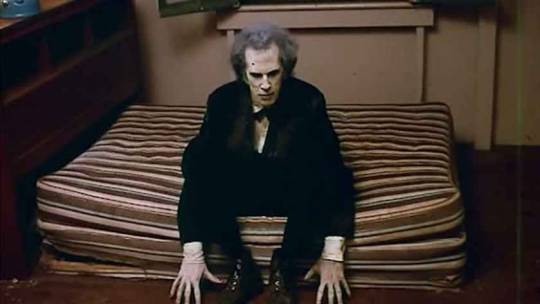
Did you know when you were cast that you were going to be the lead zombie?
SKLAREY: No, it was all in the script but I wasn’t given too much access to the script. [Alan] Ormsby probably made half of it up as he went along too but there was a script. I had no lines so I guess they figured there really wasn’t any reason to give me a script. I never knew what was going on!
How long did it take you to put on the makeup?
SKLAREY: It used to take three hours at night to put it on and two hours in the morning to get it off. A guy named Gary and a girl, whose name I don’t remember, maybe Ann Farmer, did my makeup. They put it on but I usually took it off myself once I got home. It was latex pieces that they would put on and then paint over. Then they dried it all with hair dryers. The hair was my own but they put some stuff in it to make it look white.
I had not thought about the challenge of lying perfectly still before, but you are right. Being still is something that I could do, but, even with my eyelids closed, small eye movements would probably give me away. Is it (staying motionless) something you have always been able to do, or did you have to work out a technique?
SKLAREY: When I was a kid I was impressed by the Hindu fakirs and always practiced shallow breathing and trying to hold my breath under water for twenty minutes. I think my record was sixty-one seconds.
Did you ever fall asleep on the set while they were filming?
SKLAREY: Oh yes, a bunch of times. The movie was filmed at the county nursery and the mosquitoes were horrendous. I would go to sleep in the coffin because I could close the lid and shut the mosquitoes out. One time, I went to sleep in the coffin when it was in the grave and these wise asses started to shovel dirt in on top of me. I came flying out of that coffin in full costume and makeup and just scared the hell out of them. They knew I was in there and they knew I was an actor but they didn’t know what to think – they weren’t expecting that!

Were there any dangerous stunts in the movie?
SKLAREY: Probably the worst was exposing us to so many mosquito bites. We could have gotten malaria, yellow fever, or dengue fever. I would not have been surprised if there weren’t a few tsetse flies out there too. There were a few bats out at the graveyard, but they could not get them on camera. Of course, Anya was kind of batty, but that is a different story.
I hope they had a padded mat or something to take the hard knock out of your fall.
SKLAREY: It was a single mattress on the floor. It would knock the breath out of you to fall on it. Fortunately I had some judo training and could take a hard fall. I always fancied myself as a stuntman and loved watching Jock Mahoney, Sally Field’s father in the TV show “Yancy Derringer,” in which he did his own stunts. Again, I knew if I did anything to break my fall it would show as phony on the screen. So, I opted for reality for the sake of art and was sore for a week.
You mentioned that Children was filmed at a plant nursery, was it on an island?
SKLAREY: No, the island was a different location. It was the Dade County plant nursery. That was where most of it was shot. The house was in Coconut Grove. It was owned by a friend of mine, Tony Gulliver. He was the still photographer on the movie. He had an old house that was typical of the type in Coconut Grove and we filmed all the interiors there.
Is that house still standing?
SKLAREY: Yes, the house is still there. Someone bought it and fixed it up but it’s still an old house. We did one shot at the end on an island off the coast of Miami. That was with us [the ghouls] sailing off in the boat. The boat was called The Ram, it was owned by an old friend of mine, Harry Boehme, who is also in the movie. He was one of the ghouls. The “graveyard” was the old Dade County plant nursery in South Dade off Old Cutler Road. It was starting to become a very affluent neighborhood, but there was a large tract behind a County Park (Matheson Hammock) where they grew plants and trees for that and other parks. It was heavily wooded and, during the hot, wet summer months, was mosquito infested. The woods were dark, damp, and clammy – ideal for a horror movie.
Carl Zittrer – Children Shouldn’t Play with Dead Things
Bob Clark Director Profile Part One Clark was born in New Orleans in 1939. “We moved to Birmingham, Alabama, we were lower middle class, but we actually had a maid.
1 note
·
View note